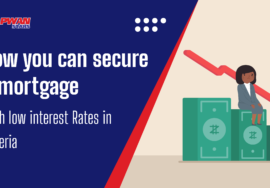
BEST TIME TO BUY REAL ESTATE PRODUCTS IN NIGERIA IN 2025

BEST TIME TO BUY REAL ESTATE PRODUCTS IN NIGERIA IN 2025
Let us establish one thing from the get go. 2025 is a good year to invest in real estate in Nigeria. If you buy a property in Nigeria in 2025, you are likely to be making a smart investment decision that would give you great returns in the years ahead. The reason for this optimism is simple: Nigeria’s economic indices in 2025 are positive for real estate investment.
As projected by the IMF, Nigeria will by the end of 2024, grow by 3.3% and at an average of 3% by 2025. This indicates that even though the economy is unstable, it is still projected to grow.
Besides that, the economy is expected to increase by 14.3% during the next 5 years, resulting in an average GDP growth rate of 2.9%.
The expected sustainable growth rate in Nigeria indicates a stable and expanding economy, which can lead to increased demand for housing and commercial properties. This growth can drive up property values and rental income, making real estate investment potentially more profitable. So, if you were unsure of whether or not to invest in 2025, you can be guaranteed that a well-researched investment will not let you down.
That said, it is important that before putting down your money for that house or land in 2025, you carefully consider the timing so that you can get maximum benefit for tour investment.
As a real estate investor, the timing of your investment is one of the most important factors that can influence the success and profitability of your venture in 2025. The decision of the best or ideal time to buy a property in Nigeria, especially when it comes to a city like Lagos, plays a critical role in determining the returns you can expect from your investment. In spite of the encouraging projections for the year, real estate markets are dynamic, and property values can fluctuate significantly over time based on several factors, which might include prevailing economic conditions, demand and supply dynamics, interest rates, season of the year, and government policies, amongst others.
In essence, when you know and buy real estate property at the ideal time in Nigeria, you can get a higher value and return for your investment, compared to poor timing of real estate investment, which can lead to missed opportunities or even financial losses.
In a dynamic market like Nigeria’s, the right timing can make the difference between a profitable venture and a costly one.
The following factors often determine the best or ideal time to real a real estate property in Nigeria:
1. Market Trends; During Downturns
The best time of the year to buy real estate property is typically when the market is slow or in a downturn, as this is when property prices are usually at their lowest. During these periods, there is generally less demand, which can lead to lower competition among buyers. As a result, sellers may be more willing to negotiate on price, offering better deals and opportunities for those looking to purchase properties. In a slow market, sellers are often more motivated to close deals, and buyers can take advantage of this by securing properties at a lower cost than they would in a more competitive, high-demand market.
Additionally, buying during a downturn allows investors to enter the market at a lower entry point, increasing the potential for greater returns once the market recovers. Property values tend to appreciate over time, and purchasing during a market dip can offer significant capital gains when the economy rebounds. Moreover, a slow market can present opportunities in areas that are poised for future growth, such as those undergoing infrastructure development or urbanization. For real estate investors, understanding the timing and capitalizing on a market slowdown can lead to substantial long-term profits while minimizing the initial investment costs.
2. Weather Condition, During Rainy Season
In Nigeria, the best time to buy land is often during the rainy season, which typically spans from April to October. During this period, the real estate market tends to slow down as demand for land decreases. This is because heavy rains and flooding can make it difficult for potential buyers to assess land conditions, especially in rural or undeveloped areas. As a result, fewer buyers are actively looking to purchase land, leading to reduced competition and, in many cases, more negotiable prices. Sellers, who are eager to close deals, may be more open to price reductions or favorable payment terms to attract buyers during this slower season.
However, it’s important to note that while the rainy season can offer opportunities for better prices, it also comes with certain risks, such as the possibility of poor drainage, waterlogging, or accessibility issues in some areas. Therefore, it is essential to conduct thorough research on the land, including its location, legal status, and potential for development. Consulting with local real estate experts, such as agents or legal advisors, is crucial to understanding the specific market conditions and timing for land purchases in your desired location. Their insights can help you make an informed decision and avoid potential pitfalls.
3. Personal Financial Readiness
The best time of the year to buy real estate ultimately depends on personal financial readiness, which plays a crucial role in ensuring a successful investment. Before entering the market, it’s essential to ensure that you have a stable income, as this will enable you to cover monthly mortgage payments and other related expenses without financial strain. Having a consistent income stream gives you the security and confidence to take on a significant financial commitment like purchasing a home.
Equally important is having sufficient savings. A healthy savings account provides the necessary funds for a down payment, closing costs, and potential repairs or upgrades after purchasing the property. Without adequate savings, securing a mortgage and making a purchase may become challenging, as lenders often look for substantial down payments and the ability to cover additional expenses.
In addition to income and savings, it is vital to have a clear understanding of your financial obligations. This means evaluating your current debts, living expenses, and any long-term financial goals. Knowing where you stand financially helps you determine how much you can comfortably afford to borrow and ensures that you will not stretch yourself too thin financially. Ultimately, personal financial readiness is key to purchasing real estate at the right time, regardless of seasonal market trends.
4. During Favorable Government Policies and Regulations
In Nigeria, government’s policies have a significant impact on real estate investment. These policies can influence land acquisition processes, tax rates, building regulations, and financing options. For instance, the introduction of favorable policies such as tax incentives for real estate developers, mortgage subsidies, or infrastructure development projects can create opportunities for investors.
Conversely, unfavorable policies, such as high property taxes, land-use regulations, or restrictions on foreign ownership, can limit investment potential or reduce property values. Being aware of political developments and policy changes can help investors time their purchases to take advantage of opportunities or avoid potential pitfalls.

5. Early Stage of Development
Real estate companies or developers tend to sell properties they have just newly introduced into the market at an affordable price. They use this method to attract early birds in order to generate initial capital and create awareness for the property. This capital is used to complete or start off the development of the project, and once the project is completed or gotten to a particular stage, the price is then increased.
Taking advantage of this early stage can afford you the opportunity to buy at a huge discount. They are usually pre-launch prices that skyrocket after a while which is why it is advisable to buy off-plan when prices are still lower.
These opportunities are not without their risks, as early investors are usually not well equipped with the vicinity as they often buy within a timeframe. It is therefore advisable to do your due diligence before investing.
6. Special festive seasons
Another great time to buy real estate properties in Nigeria in 2025 is during the festive seasons when real estate companies do special promos and prize discounts.
For instance, the end of the year is an excellent opportunity to buy a property at an affordable price. A lot of real estate companies are eager to make sales before the year comes to an end. They do this by creating discount deals and giving alluring incentives.
Some real estate companies also have flexible payment plans to help you pay little by little in installments.
These opportunities usually come as festive sales, end-of-year promos, discount sales and the like. Take advantage of these deals to get an affordable property in Lagos.

In conclusion, investing in real estate properties at the right time of the year allows you to purchase properties at lower prices or at its ideal prices.
This often results in higher potential gains when the market recovers and values appreciate. On the other hand, investing at the wrong time, such as during a market peak or a bubble, may lead to overpaying for property, which can be difficult to sell or rent out at profitable rates when the market declines.
Moreover, real estate investments are typically long-term commitments and the timing of your purchase directly influences the growth and capital appreciation of your property over the years. A well-timed investment in a growing neighborhood or a location undergoing infrastructural development, for example, can lead to significant appreciation in property value, while an investment in an area facing economic challenges or oversupply could stagnate or even lose value over time.
Always keep an eye on the market trends in Lagos, listen for major infrastructure announcements and most of all, and take action when the opportunity presents itself.









